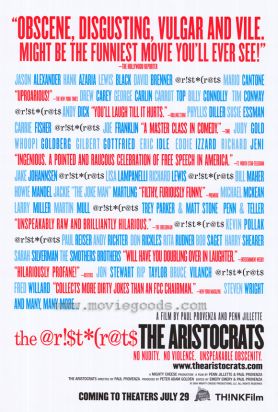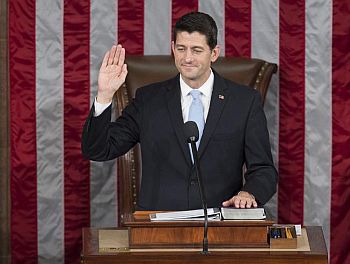The Incivility of Civility
From The New CriterionReality’s new home
Writing in these pages last February, I noted the irony of a complaint by some on the left, most notably Paul Krugman, about the allegedly incendiary rhetoric of the right when the complaint itself took the form of an accusation that those whom it condemned for rhetorical intemperance were accessories to murder. On that occasion, there was no evidence that the murderer, one Jared Loughner, had any coherent political views at all, but because his target was apparently the Democratic Congresswoman Gabrielle Giffords, whom he grievously wounded, his obscure animus was opportunistically understood to reflect the partisan spirit of every Republican, most notably Sarah Palin, who had ever expressed him- or herself in terms of violent or military metaphors — and, for good measure, every one who hadn’t but who might at one time or another have had a good word to say for Governor Palin. That the media took up the cry against such “extremist” rhetoric must account for the speech given by President Obama himself to much applause from all sides calling for greater “civility” in our national discourse.
Well, that was then. The summer’s big story (if you can call it that) of negotiations over raising the national debt-ceiling aroused such passion in Professor Krugman, among others, that he referred to the Republican negotiators as blackmailers and hostage-takers willing to blow up the world economy if they didn’t get what they wanted. So much for civility. Nor was he alone on the left in using extreme and violent rhetoric about those with whom he disagreed. His New York Times colleagues Thomas Friedman, Nicholas Kristof and Joe Nocera respectively compared the Tea Party wing of the GOP, which they blamed for keeping tax increases out of the final deal to raise the ceiling, to its “Hezbollah faction,” to Al Qaeda-like “zealots” and to “terrorists,” though Mr Nocera later apologized — sort of. He still pretty much thinks of the Republicans as terrorists but acknowledges that he has been hypocritical to say so after calling for greater civility.
I wonder, however, if he isn’t slightly missing the point. “Civility” became the fad among liberals at the moment when Republicans, many of them Tea Party supporters, were taking over the House of Representatives in January. It was never meant to apply to right and left equally. Civility for thee but not for me was always implicit. Professor Krugman, never renowned either before or since for his own civility towards those with whom he disagrees, was making a specific complaint about Republican partisans, but he was not making it to Republican partisans. Rather, safe in the knowledge that only his fellow Democratic partisans bother to read his column — or, indeed, much of anything else on The New York Times op ed or editorial pages — anymore, the Nobel prize-winning professor was just engaging in a bit of cheerleading for those who, like himself, were already persuaded of the Republicans’ perfidy and wanted to be given more examples of it, more things to blame them for, in order to stoke their resentments further. Needless to say, there have been no apologies or acknowledgments of hypocrisy from him.
As Mickey Kaus has noticed, “the Times is a struggling new media company now, and in new media the readers, viewers and dollars go to those who tell committed partisans and ideologues what they want to hear.” In mere partisanship, there are few calls for civility. Thus, when Vice-President Biden reportedly took up the “terrorist” analogy to characterize Republican congressmen, it was in a closed meeting of Democratic congressmen. What do we expect ever more aggrieved liberals and Democrats, frustrated in their unrealistically high hopes for the Obama presidency, to talk like among themselves? The media, of course, shared those hopes, and they too, lip-service aside, have largely abandoned the old pretense of non-partisanship and, outside of the right-wing media ghetto, have joined this internal Democratic conversation. Zack Munson at The Weekly Standard blogs finds a certain one-upmanship among the media’s practitioners of rhetorical excess, particularly at the Washington Post, where Ruth Marcus’s comparison of the Tea Partiers to “carjackers” was seen and raised by Jonathan Capehart who felt that such footling criminality on the part of the Republicans would justify President Obama in emulating the mythical criminal mastermind Keyser Söze from the 1995 movie The Usual Suspects — a man of whom it is said that he “so out-crazied the crazies that he became a person not to be messed with.”
As Mr Munson notes, that is an unexpectedly coy way to describe someone supposedly guilty of rape, arson and multiple murders, but I suppose a word to the wise is sufficient. Keyser Söze is also identified in the movie with the devil, an equally mythical figure in the progressive imagination, who also made an appearance in Representative Emmanuel Cleaver’s description of the debt-ceiling deal as a “a sugar-coated Satan sandwich.” Such language might be thought self-discrediting in its ludicrous excess, except that ludicrous excess is rapidly becoming as much the default mode of media opinion-mongering as it is of Hollywood movie-making. I wonder if the two could be in any way related? At least those, like Mr Capehart, who deal in such stuff must know what they are doing and to that extent must be doing it with tongue in cheek.
Mustn’t they? Perhaps we shouldn’t be so sure. Consider the case of Froma Harrop, who was taken to task by James Taranto of The Wall Street Journal for accusing “tea party Republicans” of “economic terrorism” even though she is the head of the National Conference of Editorial Writers, whose Civility Project is designed “to raise the standard of public discourse.” Far from showing any of the poverty of spirit of Joe Nocera or expressing any shame or remorse about such a seemingly obvious contradiction, however, Ms Harrop defended her incivility by not just saying that the Tea-Partiers are too like terrorists but that they really are terrorists, no different from and even worse than those who are said to be plotting to hack into the power grid in order to shut it down. “Blowing up the U.S. economy to make a point,” she writes, taking literally Paul Krugman’s seemingly metaphorical complaint to George Stephanopoulos, “would be an even more serious attack, in my book. And that’s what the tea party saboteurs were threatening. They are what they are” — that is, terrorists.
Such analogical certitude has long been typical of the Marxist-Leninist left, which pioneered the rhetorical technique of characterizing even the most moderate of its opponents as “fascists”, “saboteurs” and “wreckers,” not to mention terrorists, back in the 1930s. I would not wish to be thought of as implying that the totalitarian ambitions of Professor Krugman or Froma Harrop extend to the establishment of a new Gulag or Lubyanka prison in the land of the free and the home of the brave, but it is not at all far-fetched to imagine that they would willingly silence those who disagree with them if they could. John Kerry, a man of the same ideological stripe, said as much in calling on the media to censor Tea Partiers and their point of view. “The media in America has [sic] a bigger responsibility than it’s exercising today,” he said on MSNBC’s “Morning Joe” show at the time of the debt-ceiling debate. “The media has got to begin to not give equal time or equal balance to an absolutely absurd notion just because somebody asserts it or simply because somebody says something which everybody knows is not factual.”
That which “everybody knows” (another traditional Marxist formulation) is not factual is the Tea Party’s belief in the connection between excessive levels of government debt and the country’s economic woes. The Krugmanite tendency, relying on Keynesian thinking, holds that the record deficits run up under the Obama administration need to be even greater in order to pull the country out of recession — which, if arguable, is hardly something that “everybody knows.” You could be pardoned for beginning to wonder what else such thinking might have in store for those of us who don’t even rise to the level of inclusion in the class of “everybody.” According to the Senator, the Tea Party’s crack-brained notion of fiscal responsibility “doesn’t deserve the same credit as a legitimate idea about what you do. And the problem is everything is put into this tit- for-tat equal battle and America is losing any sense of what’s real, of who’s accountable, of who is not accountable, of who’s real, who isn’t, who’s serious, who isn’t?”
“Real” is a tough one, isn’t it? Or at least it used to be thought so. But for Senator Kerry as for Froma Harrop it obviously is not. He knows, or claims to know, what’s real and what isn’t with perfect clarity, so let’s just consider for a moment what he had in mind when he used the word — namely a bit of economic orthodoxy from the 1930s which to many economists has long been discredited but which to him is a mental construct as “real” and “factual” as any concrete object. Just as, to Ms Harrop, actual bombs, bodies and broken buildings are no more real than what she (or perhaps Professor Krugman) imagines could happen to the economy (itself a mental construct) if the Tea Party is not suppressed or restrained, so too, to John Kerry, there can be no more doubt that his own “idea about what [to] do” is “legitimate” than that that of the other side is not. This is the mark of the intellectual: what he thinks about things is real, the things themselves, comparatively, only illusions. It’s actually more like religious faith than the sort of political reasoning once described as “debate,” though belief like incivility is only supposed to apply to right-wing troglodytes and their obviously false consciousness.
That so much of the acrimony in American political life comes from the intellectual snobbery of many in the media and political élites may seem surprising, but Senator Kerry’s pronouncements are hardly the only example. Let Jacob Weisberg in Slate draw the obvious comparison:
Some of the congressional Republicans who are preventing action to help the economy are simply intellectual primitives who reject modern economics on the same basis that they reject Darwin and climate science. Others are obviously cynical, desiring the worst possible economy as an aid to recapturing the White House and Senate in 2012. Still others simply do not believe that government action can ever be a force for good at any time or in any way. Whatever their motivations, there is something terribly sad about desperate and unemployed Americans looking for rescue to a party that lacks any inclination to alleviate their misery.
James Taranto has fun agreeing with Mr Weisberg on the similarities between “modern economics” and “climate science” as he understands them.
Both are liberal dogmas disguised, increasingly thinly, as science. Both are supported by circular logic, and thus lack falsifiability, a necessary characteristic of a scientific theory. If the weather gets warmer, that’s because of global warming; if it gets colder, that’s “climate change” and proves the theory too. Had unemployment stayed below eight per cent, as the Obama administration promised it would, that would have proved the “stimulus” worked; since it peaked at ten per cent and has held steady above nine per cent, that proves the stimulus wasn’t big enough. Heads I win, tails you lose. To Weisberg, the failures of the Obama administration prove not only that Republicans are “intellectual primitives” but that you are stupid: Among the “sobering lessons” that “we” have “learned,” he writes, is “that there’s no point trying to explain complicated matters to the American people.”
The American people! Really, the category of “everybody” is shrinking with alarming rapidity. Reality, we are to suppose, resides in those “complicated matters” that clever people like Mr Weisberg understand (or claim to understand) and the American people do not. Such intellectual vanity can hardly surprise us, therefore, by going on to describe those who hold a different view of reality as “mindless cannibals” who are “now feasting on a supine president” — which at least makes for an entertaining variation on the “terrorist” trope.
What we are seeing here, I think, is not so much a foreshadowing of revolution and civil war, which often is the consequence of such certainty in belief, as the intellectual equivalent of what Bill Bishop describes as The Big Sort. Though his book is subtitled, “Why the Clustering of Like-Minded Americans is Tearing Us Apart,” that is itself a bit of hyperbole to describe what amounts to a voluntary segregation. And just as, on Mr Bishop’s showing, left and right over the last quarter century or so have tended to an extent hitherto unknown to sort themselves into homogeneous groups geographically, so they are sorting themselves in our intellectual, cultural and political life as well into like-minded enclaves. The media, in particular, can no longer be spoken of without specification either as the left-wing — also known as the “mainstream” — media, which becomes ever more left, or the right-wing media, such as it is, which becomes ever more right.
The question of civility of discourse cannot be separated from that of who are the parties to the discourse. When Paul Krugman or Froma Harrop calls someone a terrorist or Jacob Weisberg calls someone a cannibal, whether their intent is literal or metaphorical, they are not writing in order to persuade the terrorists or the cannibals to mend their ways. Their audience is rather the universe of those who already believe, or are disposed to believe, that the Republicans or the Tea Partiers are terrorists or cannibals or as good as — those, that is, who share their own mental models of “reality” as consisting of odds and ends of global warmism, Darwinian evolutionary theory and Keynesian economics.
As a Cantabridgian myself, I suppose I should take a certain pride in my old University’s disproportionate contribution to this now-dominant intellectual model, but I can’t help wondering what we did for reality before these geniuses came along. The point is that you have to be smart now to “get” reality. Reality used to be the thug that whacked you on the base of the skull with a sock full of sand when you weren’t looking. It’s what liberals used to be mugged by before they were turned into neoconservatives. Now, reality is the professor with a set of calculations so intricate that only a fellow member of the professorial guild can understand them. You and I have to take it on faith that he knows what we don’t and that reality is not what’s obvious but what’s hidden behind all those formulae on the blackboard. And, of course, no rhetorical fate can be bad enough for those who continue perversely to deny such undeniable certainties. That’s why those who have built those airy mansions they call “reality” out of Keynesian cloudiness, in particular, seem to think that it is not even arguable that there could be any connection between getting the country’s fiscal house in order and making an economic recovery. Keynes (or his acolytes) settled the matter long ago to their satisfaction, and the ignorant who would continue to argue about it are, in Mr Weisberg’s merciless characterization, either stupid, cynical or ideologically blinded. There is no fourth possibility.
If I am right about the reason why the rhetorical paladins of the left feel no shame about applying a transparently double standard of civility to the right, it also explains the other big story of the mid-summer doldrums, that of the News of the World phone hacking scandal. At least for a while it seemed as if this would be a comparably big story when Rupert Murdoch took the extraordinary step of shutting down that Sunday tabloid, which has long been the best-selling newspaper in Britain as well as a cultural institution. The intent in blowing up his own paper seems to have been to create a mighty puff of wind which would put out the fire then licking at the foundations of the News International empire. In this it failed, but ultimately the fire may be allowed to burn itself out by the emerging evidence that phone-hacking and other such shenanigans were far from being unique to the Murdoch press in Britain and even seem to have been engaged in by The Guardian, which had made most of the running in keeping the scandal alive, and by one of the investigative team which had uncovered the evidence that set it in motion. “Investigative journalism is not a dinner party,” wrote David Leigh about the conviction for phone hacking of Clive Goodman, the News of the World’s royal editor back in 2006:
But it all depends on what the target is. I’ve used some of those questionable methods myself over the years. I, too, once listened to the mobile phone messages of a corrupt arms company executive — the crime similar to that for which Goodman now faces the prospect of jail. . .But unlike Goodman, I was not interested in witless tittle-tattle about the royal family. I was looking for evidence of bribery and corruption. And unlike the News of the World, I was not paying a private detective to routinely help me with circulation-boosting snippets. That is my defence, when I try to explain newspaper methods to my current university journalism students, and some of whom are rather shocked.
The sometime Guardian protégé and collaborator Julian Assange of Wikileaks made a similar point even more pointedly a year before the most recent unpleasantness when he wrote that “the News of the World didn’t go far enough.”
The Guardian, in seeing an opportunity to attack a journalistic and a class rival, has been doing its level best to castrate British Journalism by tut-tuting in article after article about the News’ alleged sourcing improprieties; A tabloid newspaper doing investigative journalism! Journalists skirting the law to expose the truth! The long suffering of British billionaires — and the Royalty! And did we mention that the News is owned by Rupert Murdoch? — so, um. . .you know, the enemy of my enemy and all that! The Guardian’s coverage is disproportionate. It is moral opportunism. It is the worst kind of snobbery.
Say what you will about him, Mr Assange clearly represents the current tendency of journalism both in Britain and the U.S. Having risen to its current state of cultural hegemony on the strength of the Watergate myth — that no man is above the law — the media ethos is now itself “skirting” the principle that those whose intentions are good, who are clever, in touch with “reality” and on the right side politically, like journalists themselves, are above the law. It should not be surprising that this is the destination at which the intellectual vanity of our public culture is on the point of arriving; what would be surprising today would be to find anyone with the intellectual and moral humility to regret it.
Discover more from James Bowman
Subscribe to get the latest posts to your email.







